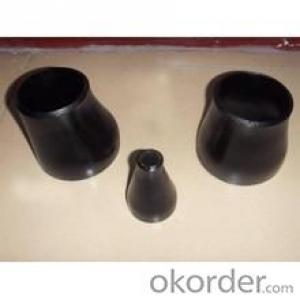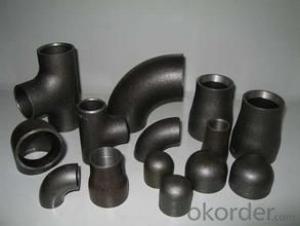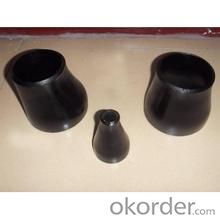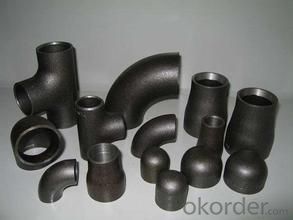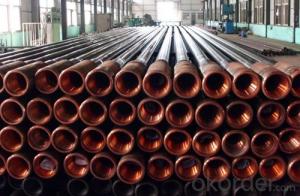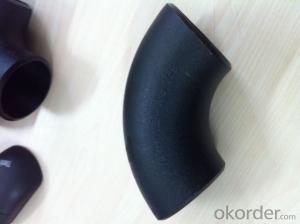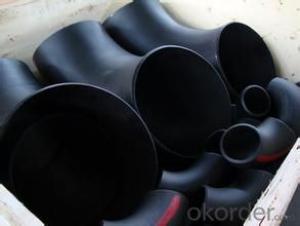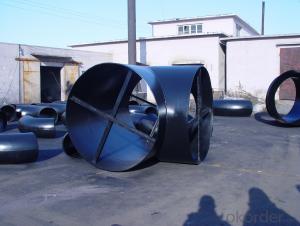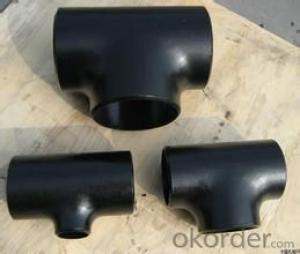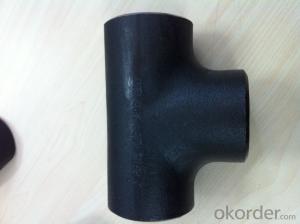CARBON STEEL PIPE BUTT WELDED 90D ELBOW LR A235 WPB ANSI B16.9 good price
- Loading Port:
- Tianjin
- Payment Terms:
- TT or LC
- Min Order Qty:
- 10 m.t.
- Supply Capability:
- 10000 m.t./month
OKorder Service Pledge
OKorder Financial Service
You Might Also Like
Package Of Carbon Steel Butt-Welded Fitting:
PACKED IN PLYWOOD CASES OR PALLETS
Painting Of Carbon Steel Butt-Welded Fitting:
BLACK PAINTING FOR CARBON STEEL
Marking Of Carbon Steel Butt-Welded Fitting:
REFER TO MARKING DOCUMENT or AS PER CUSTOMER REQUEST
Shipping Marks Of Carbon Steel Butt-Welded Fitting:
EACH WOODEN BOX TWO PLASTIC SHIPPING MARKS
Specification Of Carbon Steel Butt-Welded Fitting:
Carbon Steel A234 WPB 90Deg LR Elbow, Tee, Reducer and Cap
Size : 1/2"-48"
Wall Thickness.: SCH10-SCH160, SGP , XS, XXS, DIN ,STD
| Name | ASTM A234 WPB carbon steel ELBOW , tee , reucer, and cap |
| Size | 1/2" - 48" |
| Angle | 45D 90 D 180D |
| Wall thickness | Sch5-Sch160 XXS,STD,XS, SGP |
| Standard | ASME B16.9, GOST 17375-2001, DIN2605 and JIS B2311, EN10253-1 etc. |
| We can also produce according to drawing and standards provided by customers. | |
| Material | Carbon steel pipe fittings , alloy steel and stainless steel. |
| Packaging | Wooden Cases, wooden pallet , or carton box , or nylog bag and then in wooden cases |
| Surface Treatment | Paintting black color , and Shot blasted,anti-rust oil , |
| Delivery Time | 20-30 days, after received advance payment. |
| Quality | First grade |
| Others | 1.Special design available according to your drawing. |
| 2.anti-corrosion and high-temperature resistant with black painting | |
| 3. All the production process are made under the ISO9001:2000 strictly. | |
| 4. A conformity rate of ex-factory inspection of products. | |
| 5. we have export right , offering FOB , CNF CIF price |
STANDARD & MATERIAL GRADE
STANDARD Of Carbon Steel Butt-Welded Fitting
| Standard | Wall Thickness | Type | |
| American Standard | ASME B16.9 | S5S ~ XXS | 45D, 90D, 180D ELBOW, TEE, REDUCER, CAP, STUB END |
| ASME B16.11 | |||
| ASME B16.28 | 90D SR ELBOW | ||
| Japanese Standard | JIS B2311 | SGP ~ LG |
MATERIAL Of Carbon Steel Butt-Welded Fitting
| Carbon Steel | ||
| Material Standard | Material Grade | |
| ASTM | ASTM A234 | WPB |
- Q: Can steel pipes be used for underground sewer systems?
- Yes, steel pipes can be used for underground sewer systems. Steel pipes are known for their durability, strength, and resistance to corrosion, making them a suitable choice for underground applications such as sewer systems. However, it is important to consider factors like soil conditions, potential for corrosion, and local regulations before selecting steel pipes for an underground sewer system.
- Q: What is the standard length of a steel pipe?
- The standard length of a steel pipe can vary depending on the industry and application. However, in general, the standard lengths of steel pipes range from 18 to 24 feet. These lengths are commonly used in construction, plumbing, and other industrial applications. It is important to note that custom lengths can also be obtained to suit specific project requirements.
- Q: Difference between cold rolled steel pipe and common steel pipe
- From the above point of view, the hot rolled steel pipe used in fluid transport, mechanical structure and other requirements of the size of the situation is not high, cold-rolled steel pipe used in precision instruments, hydraulic systems, pneumatic and other places demanding.
- Q: What are the different types of steel pipe reducers?
- There are several types of steel pipe reducers, including concentric reducers, eccentric reducers, and reducing tees.
- Q: What is the maximum bending radius for steel pipes?
- The maximum bending radius for steel pipes is determined by several factors, including the diameter of the pipe, the thickness of its walls, and the specific type of steel used. In general, pipes with larger diameters and thicker walls will have a greater maximum bending radius. However, it is crucial to adhere to industry standards and guidelines to ensure that the structural integrity of the pipe remains intact during the bending process. To obtain precise details regarding the maximum bending radius for steel pipes in various applications, it is recommended to consult the manufacturer's specifications or refer to relevant codes and standards, such as the American Society of Mechanical Engineers (ASME) B31.1 or B31.3.
- Q: Are steel pipes suitable for use in automotive industries?
- Yes, steel pipes are suitable for use in automotive industries. Steel pipes offer high strength, durability, and resistance to corrosion, making them ideal for various applications in the automotive sector, such as exhaust systems, suspension systems, and fuel delivery systems. Steel pipes can withstand high temperatures and pressures, ensuring reliable performance and safety in automotive vehicles.
- Q: What are the different types of steel pipe supports for high-temperature applications?
- There are several types of steel pipe supports designed specifically for high-temperature applications. Some common ones include rigid supports, such as rigid hangers and clamps, which provide strong support and prevent pipe movement. Expansion joints are also used to accommodate thermal expansion and contraction in the pipes. Additionally, spring supports and constant supports are employed to absorb vertical movement and maintain a consistent pipe elevation.
- Q: Are steel pipes suitable for transporting gas?
- Yes, steel pipes are suitable for transporting gas. Steel pipes are known for their durability and strength, making them ideal for transporting gas safely over long distances. They are resistant to corrosion and can handle high pressure, making them a reliable choice for gas transportation.
- Q: What are the common standards and specifications for steel pipes?
- The common standards and specifications for steel pipes include ASTM A53, ASTM A106, API 5L, and ISO 3183. These standards outline the requirements for the manufacturing, dimensions, and mechanical properties of steel pipes used in various industries such as oil and gas, construction, and transportation. Additionally, specific applications may have their own standards and specifications that need to be met for quality and safety purposes.
- Q: How are steel pipes used in the chemical industry?
- Steel pipes are widely used in the chemical industry for various purposes such as transporting chemicals, gases, and liquids. They are known for their strength, durability, and resistance to corrosion, making them suitable for handling corrosive substances. Steel pipes are used for transferring raw materials, intermediate products, and final products within chemical plants, as well as for connecting different equipment and machinery. They are essential for maintaining a safe and efficient flow of chemicals throughout the industry.
Send your message to us
CARBON STEEL PIPE BUTT WELDED 90D ELBOW LR A235 WPB ANSI B16.9 good price
- Loading Port:
- Tianjin
- Payment Terms:
- TT or LC
- Min Order Qty:
- 10 m.t.
- Supply Capability:
- 10000 m.t./month
OKorder Service Pledge
OKorder Financial Service
Similar products
Hot products
Hot Searches
Related keywords
